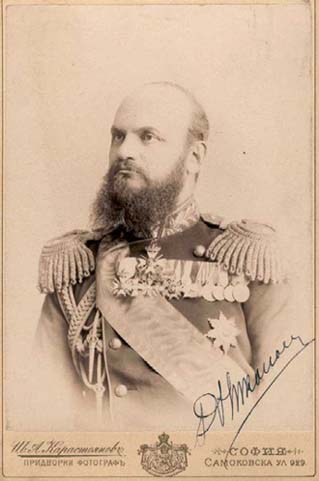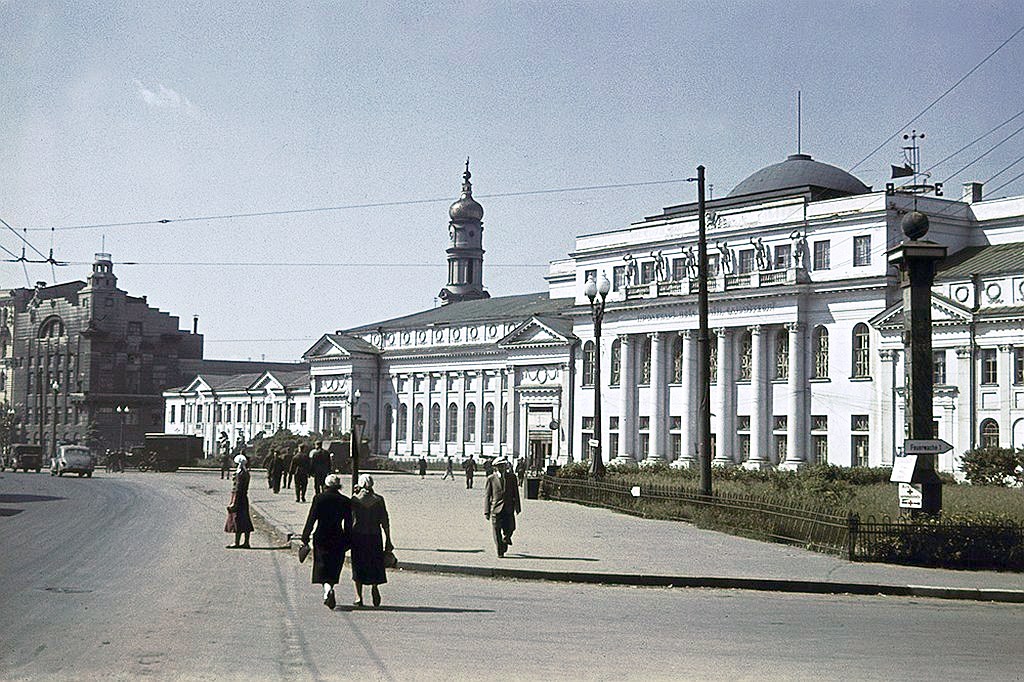|
Culai Neniu
Culai Neniu (russian: ąÜčāą╗ą░ą╣ ąØąĄąĮčÄ; born Nikolai Semyonovich Nenev, ąØąĖą║ąŠą╗ą░ąĖ ąĪąĄą╝čæąĮąŠą▓ąĖčć ąØąĄąĮąĄą▓, also N. S. Nenev-Potynga, ąØ. ąĪ. ąØąĄąĮąĄą▓-ą¤ąŠčéčŗąĮą│ą░; 1905ŌĆō1939) was a Moldovan folklorist, dramatist, and schoolteacher. Of a Bessarabian Bulgarian background, he left the Kingdom of Romania to settle in the Soviet Union, making his way into the Moldavian Autonomous Soviet Socialist Republic (MASSR). He published several volumes of " Moldavian" folklore, generally professional in nature, but also tinged by the effects of Soviet historiography. With Ekaterina Lebedeva, Neniu put out in 1935 the anthology ''C├«ntece poporane moldovene╚Öti'' ("Moldavian Folk Songs"), noted as the only work of its kind to coincide with the Latinization of Soviet scripts. The collection was criticized in Romania for excluding religious folklore, but was also in contradiction with the MASSR's state ideology. This resulted in Neniu's execution by the NKVD, four years after publ ... [...More Info...] [...Related Items...] OR: [Wikipedia] [Google] [Baidu] |
Bessarabian Bulgarians
The Bessarabian Bulgarians ( bg, ą▒ąĄčüą░čĆą░ą▒čüą║ąĖ ą▒čŖą╗ą│ą░čĆąĖ, ''besarabski bŪÄlgari'', ro, bulgari basarabeni, uk, ą▒ąĄčüą░čĆą░ą▒čüčīą║č¢ ą▒ąŠą╗ą│ą░čĆąĖ, ''bessarabski bolh├Īry'') are a Bulgarian minority group of the historical region of Bessarabia, inhabiting parts of present-day Ukraine (Odesa Oblast) and Moldova. Location and number Modern Ukraine In Ukraine, the number of Bessarabian Bulgarians is estimated at over 129,000 in Budjak (in the Odesa Oblast in the southern part of the country), and 75,000 elsewhere (mostly in other parts of Southern Ukraine), according to the 2001 Ukrainian Census, which counted a total of 204,600 Bulgarians in Ukraine. Bulgarians are a majority in Bolhrad District (45,600 of its 75,000 inhabitants), but they also inhabit other districts of Budjak: Artsyz ŌĆō 20,200 of the 51,700, Tarutyne ŌĆō 17,000 of the 45,200, Izmail ŌĆō 14,100 of the 54,700, and Sarata ŌĆō 10,000 of the 49,900. There are also 8,600 Bulgarians in the city of ... [...More Info...] [...Related Items...] OR: [Wikipedia] [Google] [Baidu] |
Tiraspol
Tiraspol or Tiri╚Öpolea ( ro, Tiraspol, Moldovan Cyrillic: ąóąĖčĆą░čüą┐ąŠą╗, ; russian: ąóąĖčĆą░╠üčüą┐ąŠą╗čī, ; uk, ąóąĖčĆą░čüą┐ąŠą╗čī, Tyraspol') is the capital of Transnistria (''de facto''), a breakaway state of Moldova, where it is the third largest city. The city is located on the eastern bank of the Dniester River. Tiraspol is a regional hub of light industry, such as furniture and electrical goods production. The modern city of Tiraspol was founded by the Russian generalissimo Alexander Suvorov in 1792, although the area had been inhabited for thousands of years by varying ethnic groups. The city celebrates its anniversary every year on 14 October. Etymology The toponym consists of two ancient Greek words: ╬żŽŹŽü╬▒Žé, '' Tyras'', the Ancient name for the Dniester River, and ''polis'', i.e., a city (state). History Classical history Tyras (╬żŽŹŽü╬▒Žé), also spelled ''Tiras'', was a colony of the Greek city Miletus, probably founded about 600 BC, situa ... [...More Info...] [...Related Items...] OR: [Wikipedia] [Google] [Baidu] |
Proletarian Internationalism
Proletarian internationalism, sometimes referred to as international socialism, is the perception of all communist revolutions as being part of a single global class struggle rather than separate localized events. It is based on the theory that capitalism is a world-system and therefore the working classes of all nations must act in concert if they are to replace it with communism. Proletarian internationalism was strongly embraced by the first communist party, the Communist League, as exercised through its slogan "Proletarians of all countries, unite!", later popularized as "Workers of the world, unite!" in English literature. This notion was also embraced by the Bolshevik Party. After the formation of the Soviet Union, Marxist proponents of internationalism suggested that country could be used as a "homeland of communism" from which revolution could be spread around the globe. Though world revolution continued to figure prominently in Soviet rhetoric for decades, it no lo ... [...More Info...] [...Related Items...] OR: [Wikipedia] [Google] [Baidu] |
Self-criticism (MarxismŌĆōLeninism)
Self-criticism (Russian: ąĪą░ą╝ąŠą║čĆąĖčéąĖą║ą░, ''Samokritika''; Chinese: Ķ欵łæµē╣Ķ»ä, ''Z├¼wŪÆ p─½p├Łng''; Vietnamese: Tß╗▒ ph├¬ b├¼nh) is a philosophical and political concept developed within the ideology of MarxismŌĆōLeninism, Stalinism, and Maoism. According to David Priestland, the concept of "criticism and self-criticism" developed within the Stalinist period of the Soviet Union as a way to publicly interrogate intellectuals who were suspected of possessing counter-revolutionary positions. The concept would be a major component of the political philosophy of Chinese Marxist leader Mao Zedong. The concept of self-criticism is a component of some Marxist schools of thought, primarily that of MarxismŌĆōLeninism, Stalinism, Maoism and MarxismŌĆōLeninismŌĆōMaoism. The concept was first introduced by Joseph Stalin in his 1925 work ''The Foundations of Leninism'' and later expanded upon in his 1928 work ''Against Vulgarising the Slogan of Self-Criticism''. The Marxist conce ... [...More Info...] [...Related Items...] OR: [Wikipedia] [Google] [Baidu] |
Limba Rom├ón─ā (magazine)
''Limba Rom├ón─ā'' () is a magazine from the Republic of Moldova founded in 1991 by Ion Dumeniuc. History Alexandru Banto╚Ö has been the editor in chief since 1992. Leo Bordeianu was a secretary-general (1991ŌĆō2002). The magazine is sponsored by the Romanian Cultural Institute.Timpul de diminea╚ø─āLimba rom├óna are propriul s─āu site/ref> References External links Limba Rom├ón─ā* Timpul de diminea╚ø─ā ''Timpul de diminea╚ø─ā'' (Romanian for "The Morning Times") or, in short, ''Timpul'' ("The Time"), is a Moldovan newspaper founded in 2001 by Constantin T─ānase. Overview The director of ''Timpul de diminea╚ø─ā'' is Constantin T─ānase. Laun ...Limba rom├óna are propriul s─āu sitee-literatura: ŌĆ×Limba Rom├ón─āŌĆØ, (┼¤i) pe InternetLimba Rom├óna - ortografia.ro - Sa scriem si sa ne exprimam corect in limba rom├óna. {{DEFAULTSORT:Limba Romana 1991 establishments in Moldova Magazines established in 1991 Literary magazines published in Moldova Romanian-language magazin ... [...More Info...] [...Related Items...] OR: [Wikipedia] [Google] [Baidu] |
Bocet
Bocet is a form of Romanian folk music Folk music is a music genre that includes traditional folk music and the contemporary genre that evolved from the former during the 20th-century folk revival. Some types of folk music may be called world music. Traditional folk music has .... Bocet is a lament in free rhythm. The bocet is sung by one or more people with their eyes in tears or just expressing a deep grief. Encountered throughout Romania, bocet is a part of the traditional mourning observances. Music of Romania {{Music-genre-stub ... [...More Info...] [...Related Items...] OR: [Wikipedia] [Google] [Baidu] |
Colind─ā
A colind─ā (pl. colinde; also colind, pl. colinduri) is a traditional Christmas carol in Romania and the Republic of Moldova. Origins Although the text of all ''colinde'' is concerned with the events of the Nativity, certain elements of the folk rituals performed around Christmas are probably pre-Christian in origin, having their roots in the Roman Saturnalia and pagan rituals related to the winter solstice and soil fertility. ''Colinde'' are performed in all parts of Romania (including Moldova), with regional variations in terms of number of participants, exact timing of different melodies and lyrics. In terms of artistic mastery of verse and melody, ''colinde'' occupy an important place in the creation of the Romanian people. They form a unity with '' doine'', popular ballads and songs of bravery, with tales, riddles, proverbs and sayings. Coming from the world of village communities, ''colinde'' preserve some of the oldest Romanian poetic achievements. They are inspired by t ... [...More Info...] [...Related Items...] OR: [Wikipedia] [Google] [Baidu] |
Nichita Smochin─ā
Nichita Parfeni Smochin─ā (; Moldovan Cyrillic: ąØąĖą║ąĖčéą░ ą¤ą░čĆč乥ąĮąĖ ąĪą╝ąŠą║ąĖąĮčŹ, Russian: ąØąĖą║ąĖčéą░ ą¤ą░čĆč乥ąĮčīąĄą▓ąĖčć ąĪą╝ąŠą║ąĖąĮą░, ''Nikita Parfenievich Smokina''; also known as Mihai Florin; March 14, 1894 ŌĆō December 14, 1980) was an ethnic Romanian activist, scholar, and political figure from what is now Transnistria. He is especially noted for campaigning on behalf of Romanians in the Soviet Union. He was first active in the Russian Empire, serving with distinction in World War I. He turned to Romanian nationalism in 1917 when he was serving as an officer in Russian Transcaucasia. Smochin─ā met Bolshevik leader Vladimir Lenin, recording Lenin's then-tolerant views on Romanian emancipation. Smochin─ā was then active in the Ukrainian People's Republic, where he led the general caucus formed by Romanians in Tiraspol. He was also part of the Central Council, and earned his reputation as a champion of Transnistrian Romanian interests. An anti-communist, Smoch ... [...More Info...] [...Related Items...] OR: [Wikipedia] [Google] [Baidu] |
Russian Orthodox Church
, native_name_lang = ru , image = Moscow July 2011-7a.jpg , imagewidth = , alt = , caption = Cathedral of Christ the Saviour in Moscow, Russia , abbreviation = ROC , type = , main_classification = Eastern Orthodox , orientation = Russian Orthodoxy , scripture = Elizabeth Bible (Church Slavonic language, Church Slavonic)Russian Synodal Bible, Synodal Bible (Russian language, Russian) , theology = Eastern Orthodox theology , polity = Episcopal polity, Episcopal , governance = Holy Synod of the Russian Orthodox Church , structure = Koinonia, Communion , leader_title = , leader_name = , leader_title1 = Primate , leader_name1 = Patriarch of Moscow and all Rus', Patriarch Patriarch Kirill of Moscow, Kirill of Moscow , leader_title2 = , leader_name2 = , leader_title3 = Bishops , leader_ ... [...More Info...] [...Related Items...] OR: [Wikipedia] [Google] [Baidu] |
Tsarist Autocracy
Tsarist autocracy (russian: čåą░čĆčüą║ąŠąĄ čüą░ą╝ąŠą┤ąĄčƹȹ░ą▓ąĖąĄ, transcr. ''tsarskoye samoderzhaviye''), also called Tsarism, was a form of autocracy (later absolute monarchy) specific to the Grand Duchy of Moscow and its successor states the Tsardom of Russia and Russian Empire. In it, the Tsar possessed in principle authority and wealth, with more power than constitutional monarchs counterbalanced by a legislative authority, as well as more religious authority than Western monarchs. The institution originated during the time of Ivan III (1462ŌłÆ1505), and was abolished after the Russian Revolution of 1917. Alternative names Imperial autocracy, Russian autocracy, Muscovite autocracy, tsarist absolutism, imperial absolutism, Russian absolutism, Muscovite absolutism, Muscovite despotism, Russian despotism, tsarist despotism or imperial despotism. History Ivan III (reigned 1462-1505) built upon Byzantine traditions and laid foundations for the tsarist autocracy whic ... [...More Info...] [...Related Items...] OR: [Wikipedia] [Google] [Baidu] |
Leninism
Leninism is a political ideology developed by Russian Marxist revolutionary Vladimir Lenin that proposes the establishment of the dictatorship of the proletariat led by a revolutionary vanguard party as the political prelude to the establishment of communism. The function of the Leninist vanguard party is to provide the working classes with the political consciousness (education and organisation) and revolutionary leadership necessary to depose capitalism in the Russian Empire (1721ŌĆō1917). Leninist revolutionary leadership is based upon ''The Communist Manifesto'' (1848), identifying the communist party as "the most advanced and resolute section of the working class parties of every country; that section which pushes forward all others." As the vanguard party, the Bolsheviks viewed history through the theoretical framework of dialectical materialism, which sanctioned political commitment to the successful overthrow of capitalism, and then to instituting socialism; and, as the ... [...More Info...] [...Related Items...] OR: [Wikipedia] [Google] [Baidu] |
Communist Party Of Ukraine (Soviet Union)
The Communist Party of Ukraine ( uk, ąÜąŠą╝čāąĮč¢čüčéąĖčćąĮą░ ą¤ą░čĆčéč¢čÅ ąŻą║čĆą░茹ĮąĖ ''Komunistychna Partiya Ukrayiny'', ąÜą¤ąŻ, ''KPU''; russian: ąÜąŠą╝ą╝čāąĮąĖčüčéąĖč湥čüą║ą░čÅ ą┐ą░čĆčéąĖčÅ ąŻą║čĆą░ąĖąĮčŗ) was the founding and ruling political party of the Ukrainian Soviet Socialist Republic operated as a republican branch ( union republics) of the Communist Party of the Soviet Union (CPSU).Pyrih, R. Communist Party of Ukraine, the Soviet period (ąÜą×ą£ąŻąØąåąĪąóąśą¦ąØąÉ ą¤ąÉąĀąóąåą» ąŻąÜąĀąÉąćąØąś ąĀąÉąöą»ąØąĪą¼ąÜą×ąć ąöą×ąæąś)'. Encyclopedia of History of Ukraine. 2007 No decision of the government of Ukraine (Council of Ministers) was adopted without approval of the Central Committee of the Communist Party of Ukraine. The Communist Party of Ukraine is not one and the same party as the Ukrainian Communist Party or Ukrainian Communist Party (Borotbists). Founded as the Communist Party (Bolsheviks) of Ukraine (CP(b)U) in 1918 in Moscow, Russian SFSR, it was the so ... [...More Info...] [...Related Items...] OR: [Wikipedia] [Google] [Baidu] |






